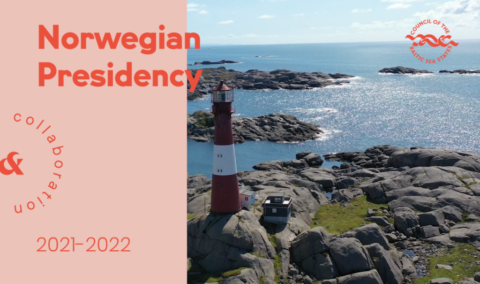The German Presidency of the CBSS Expert Group on Children at Risk prioritised the protection of children and adolescents from sexual violence. The Presidency’s initiatives included, among other things, two Expert Group meetings. The first meeting focused on issues related to sexual violence against children. The members highlighted the importance of equity of access to quality services for all children, as well as the significance of maintaining a continuous exchange of good practices with regard to violence against children. The topic of the second meeting was children with harmful sexual behaviour. The Expert Group concluded that both victims and perpetrators of harmful sexual behaviour must be identified and provided with support. There is a need for strengthened targeted therapeutic services for children and adolescents with Harmful Sexual Behaviour.
The German Presidency of the CBSS had three overall priorities: the promotion of offshore wind energy to bolster a green transition, understanding the challenges relating to the dumped munitions in the Baltic Sea, and fostering youth cooperation.
Expert group meetings
On 10-11 November 2022, the Children at Risk expert group met in Berlin for the first meeting under the German Presidency. The meeting included four external speakers. Mr Florian Rudolph, Germany’s representative in the CBSS Committee of Senior Officials, discussed the survey sent out by The Committee of Senior Officials to the expert group. Ms Kerstin Claus, Independent Commissioner for Child Sexual Abuse Issues, gave a presentation about her role as the Independent Commissioner for Child Sexual Abuse Issues. Ms Heike Völger, Head of Unit at the Office of the Independent Commission for Child Sexual Abuse Issues, outlined the purpose, aims, and approaches of the Independent Commission. Ms Susanna Fasholz-Seidel, Head of the Office of the Independent Inquiry into Child Sexual Abuse and its commission, discussed the working methods of the Independent Inquiry into Child Sexual Abuse.
The Expert Group members discussed the value and the importance of working with survivors.
The Expert group also engaged in a roundtable discussion on the protection of children from sexual violence and exploitation. The group expressed concern regarding the widespread occurrence of sexual violence against children and adolescents in the region. There was a joint commitment to continued dialogue regarding sexual violence, especially in the digital environment, harmful sexual behaviour among children and adolescents, and sexual violence within peer relationships and trusted circles. Equity of access to quality services was considered of great importance.
On 4-5 May, 2023, the Children at Risk expert group met in Berlin for the second time under the German Presidency to discuss the topic of children with harmful sexual behaviour. The meeting contained two presentations. Prof. Dr. Ludwig Stecher, Giessen University, presented the research project “Speak!” which focused on sexualised Peer to Peer Violence among youth. The research project provides findings on the prevalence, perpetrators, and consequences of peer violence in the lives of young people. Julia von Weiler, Innocence in Danger, presented the ‘#WhatAboutYou?’ pilot programme, which raised awareness about sexual violence among young people.
After the presentations, the Expert Group members engaged in a roundtable discussion on the topic of children with harmful sexual behaviour. The group emphasised that there is a need for strengthened targeted therapeutic services for children and adolescents with Harmful Sexual Behavior. Moreover, children and adolescents with harmful sexual behaviour (HSB) and sexualised violence among peers are concerning issues. These types of abuse affect many people and have potentially severe effects on victims.
Work that commenced during the Presidency
- Promoting inclusive and resilient child protection systems, including in crisis and emergency, enhancing the ability of national child protection systems to work effectively on transnational cases, which often involve children in the most precarious of situations, and supporting excellence in the practice of Barnahus. Read more…
- Strengthening the sustainability and impact of child participation mechanisms in decision-making processes at both national and local levels with a specific focus on decisions and action to build safe and secure societies, including their resilience and ability to prevent, prepare, respond, and adapt to different types of hazards and emergencies. Read more…
- Ensuring a safe and informed pathway through Barnahus for children who are presumed victims of violence. This involves designing, piloting, and evaluating a replicable, safe and informed pathway from initial report to long-term recovery and protection through the involvement of a child liaison. Read more…
- Promoting specialised interventions in cases of online sexual violence, provided in multidisciplinary and interagency models for child victims and witnesses of violence. Read more…
- 2Know – gathering data on online violence against children – improving national and international data collection on violence against children by developing a sustainable and replicable data collection model suited to gathering information about online violence against children. Read more…
Work that was finalized during the Presidency
- The phase of PROMISE (2020-2023) established a European Competence Centre for Barnahus, laid the groundwork for an accreditation system for Barnahus, and expanded PROMISE activities to include University training and case management tools. Read more…
- A Swedish Institute PROMISE project (2021-2023) which included forensic interview training with the National Children’s Advocacy Center, a study visit to Barnahus Estonia, featuring a guest speaker from Finland and additional guests from Ireland and Slovenia, and training on internationally recognised Barnahus standards and multidisciplinary teamwork in Barnahus. Read more…
Publications
- Second Addendum to the CBSS Guidelines On Promoting the Human Rights and the Best Interests of the Child in Transnational Child Protection Cases. An updated version of the first Addendum to the Guidelines On Promoting the Human Rights and the Best Interests of the Child in Transnational Child Protection Cases, published in 2016, has been released. These updated Guidelines provide a comprehensive step-by-step approach to transnational cooperation, starting from the initial identification of a child and relevant assessments, and leading to the identification and implementation of a durable solution, which may include the possibility of return. Read more…
- Building Trust and Resilience: Child Protection Systems in the Baltic Sea Region Mapping and Registry.
The Norwegian Presidency of the CBSS Expert Group on Children at Risk focused on good practices and building trust between the systems in the region. It featured a project, with funding from the CBSS Project Support Facility, which mapped child protection systems and promising practices. The summary of the mapping was published during the German Presidency and provides a concise overview of the results of the mapping in seven countries in the Baltic Sea Region (Denmark, Estonia, Finland, Germany, Iceland, Lithuania and Norway). Read more…


